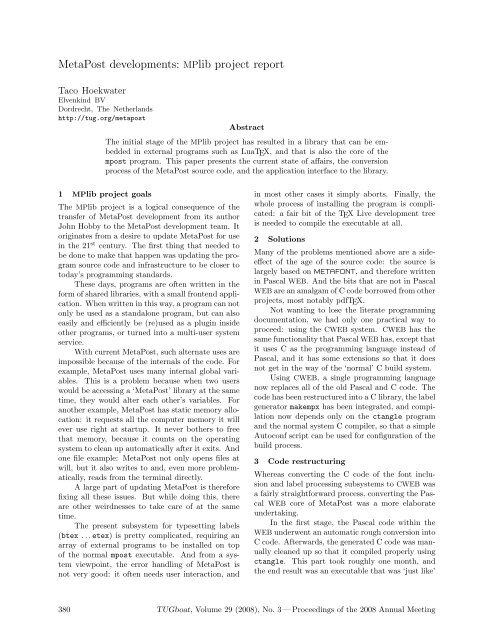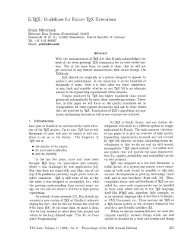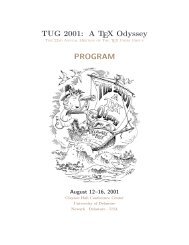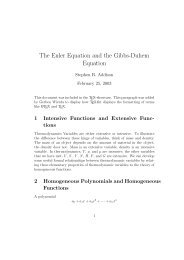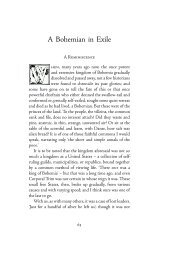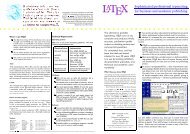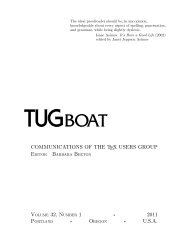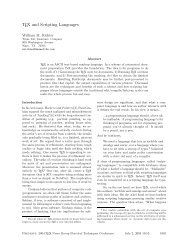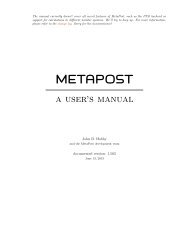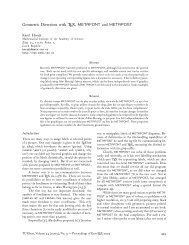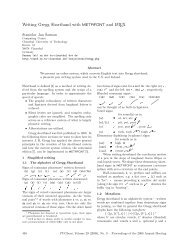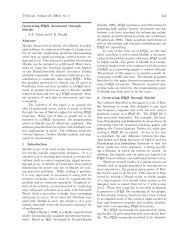The Communications of the TEX Users Group Volume 29 ... - TUG
The Communications of the TEX Users Group Volume 29 ... - TUG
The Communications of the TEX Users Group Volume 29 ... - TUG
You also want an ePaper? Increase the reach of your titles
YUMPU automatically turns print PDFs into web optimized ePapers that Google loves.
MetaPost developments: MPlib project report<br />
Taco Hoekwater<br />
Elvenkind BV<br />
Dordrecht, <strong>The</strong> Ne<strong>the</strong>rlands<br />
http://tug.org/metapost<br />
Abstract<br />
<strong>The</strong> initial stage <strong>of</strong> <strong>the</strong> MPlib project has resulted in a library that can be embedded<br />
in external programs such as Lua<strong>TEX</strong>, and that is also <strong>the</strong> core <strong>of</strong> <strong>the</strong><br />
mpost program. This paper presents <strong>the</strong> current state <strong>of</strong> affairs, <strong>the</strong> conversion<br />
process <strong>of</strong> <strong>the</strong> MetaPost source code, and <strong>the</strong> application interface to <strong>the</strong> library.<br />
1 MPlib project goals<br />
<strong>The</strong> MPlib project is a logical consequence <strong>of</strong> <strong>the</strong><br />
transfer <strong>of</strong> MetaPost development from its author<br />
John Hobby to <strong>the</strong> MetaPost development team. It<br />
originates from a desire to update MetaPost for use<br />
in <strong>the</strong> 21 st century. <strong>The</strong> first thing that needed to<br />
be done to make that happen was updating <strong>the</strong> program<br />
source code and infrastructure to be closer to<br />
today’s programming standards.<br />
<strong>The</strong>se days, programs are <strong>of</strong>ten written in <strong>the</strong><br />
form <strong>of</strong> shared libraries, with a small frontend application.<br />
When written in this way, a program can not<br />
only be used as a standalone program, but can also<br />
easily and efficiently be (re)used as a plugin inside<br />
o<strong>the</strong>r programs, or turned into a multi-user system<br />
service.<br />
With current MetaPost, such alternate uses are<br />
impossible because <strong>of</strong> <strong>the</strong> internals <strong>of</strong> <strong>the</strong> code. For<br />
example, MetaPost uses many internal global variables.<br />
This is a problem because when two users<br />
would be accessing a ‘MetaPost’ library at <strong>the</strong> same<br />
time, <strong>the</strong>y would alter each o<strong>the</strong>r’s variables. For<br />
ano<strong>the</strong>r example, MetaPost has static memory allocation:<br />
it requests all <strong>the</strong> computer memory it will<br />
ever use right at startup. It never bo<strong>the</strong>rs to free<br />
that memory, because it counts on <strong>the</strong> operating<br />
system to clean up automatically after it exits. And<br />
one file example: MetaPost not only opens files at<br />
will, but it also writes to and, even more problematically,<br />
reads from <strong>the</strong> terminal directly.<br />
A large part <strong>of</strong> updating MetaPost is <strong>the</strong>refore<br />
fixing all <strong>the</strong>se issues. But while doing this, <strong>the</strong>re<br />
are o<strong>the</strong>r weirdnesses to take care <strong>of</strong> at <strong>the</strong> same<br />
time.<br />
<strong>The</strong> present subsystem for typesetting labels<br />
(btex . ..etex) is pretty complicated, requiring an<br />
array <strong>of</strong> external programs to be installed on top<br />
<strong>of</strong> <strong>the</strong> normal mpost executable. And from a system<br />
viewpoint, <strong>the</strong> error handling <strong>of</strong> MetaPost is<br />
not very good: it <strong>of</strong>ten needs user interaction, and<br />
in most o<strong>the</strong>r cases it simply aborts. Finally, <strong>the</strong><br />
whole process <strong>of</strong> installing <strong>the</strong> program is complicated:<br />
a fair bit <strong>of</strong> <strong>the</strong> <strong>TEX</strong> Live development tree<br />
is needed to compile <strong>the</strong> executable at all.<br />
2 Solutions<br />
Many <strong>of</strong> <strong>the</strong> problems mentioned above are a sideeffect<br />
<strong>of</strong> <strong>the</strong> age <strong>of</strong> <strong>the</strong> source code: <strong>the</strong> source is<br />
largely based on METAFONT, and <strong>the</strong>refore written<br />
in Pascal WEB. And <strong>the</strong> bits that are not in Pascal<br />
WEB are an amalgam <strong>of</strong> C code borrowed from o<strong>the</strong>r<br />
projects, most notably pdf<strong>TEX</strong>.<br />
Not wanting to lose <strong>the</strong> literate programming<br />
documentation, we had only one practical way to<br />
proceed: using <strong>the</strong> CWEB system. CWEB has <strong>the</strong><br />
same functionality that Pascal WEB has, except that<br />
it uses C as <strong>the</strong> programming language instead <strong>of</strong><br />
Pascal, and it has some extensions so that it does<br />
not get in <strong>the</strong> way <strong>of</strong> <strong>the</strong> ‘normal’ C build system.<br />
Using CWEB, a single programming language<br />
now replaces all <strong>of</strong> <strong>the</strong> old Pascal and C code. <strong>The</strong><br />
code has been restructured into a C library, <strong>the</strong> label<br />
generator makempx has been integrated, and compilation<br />
now depends only on <strong>the</strong> ctangle program<br />
and <strong>the</strong> normal system C compiler, so that a simple<br />
Autoconf script can be used for configuration <strong>of</strong> <strong>the</strong><br />
build process.<br />
3 Code restructuring<br />
Whereas converting <strong>the</strong> C code <strong>of</strong> <strong>the</strong> font inclusion<br />
and label processing subsystems to CWEB was<br />
a fairly straightforward process, converting <strong>the</strong> Pascal<br />
WEB core <strong>of</strong> MetaPost was a more elaborate<br />
undertaking.<br />
In <strong>the</strong> first stage, <strong>the</strong> Pascal code within <strong>the</strong><br />
WEB underwent an automatic rough conversion into<br />
C code. Afterwards, <strong>the</strong> generated C code was manually<br />
cleaned up so that it compiled properly using<br />
ctangle. This part took roughly one month, and<br />
<strong>the</strong> end result was an executable that was ‘just like’<br />
380 <strong>TUG</strong>boat, <strong>Volume</strong> <strong>29</strong> (2008), No. 3 — Proceedings <strong>of</strong> <strong>the</strong> 2008 Annual Meeting


